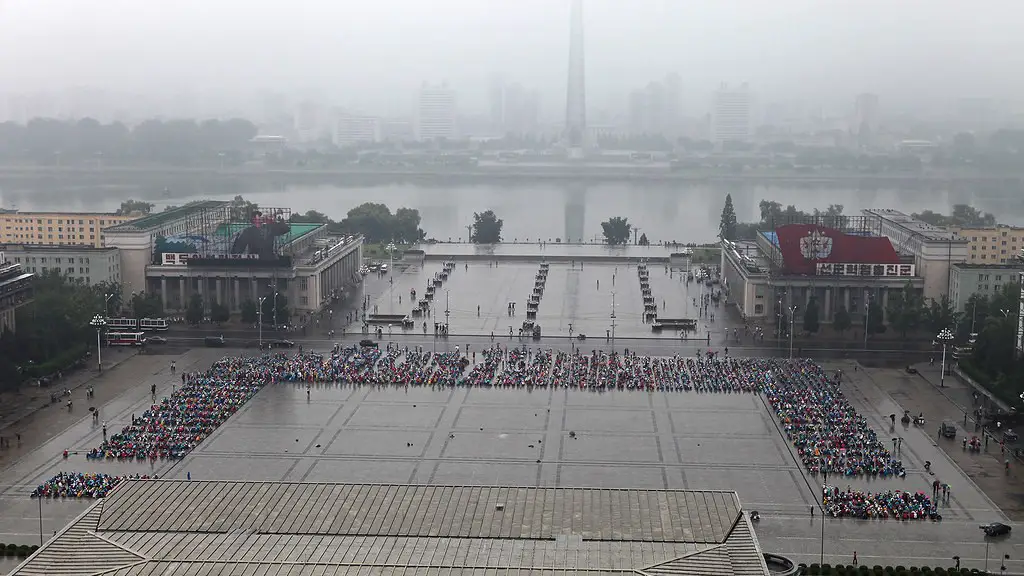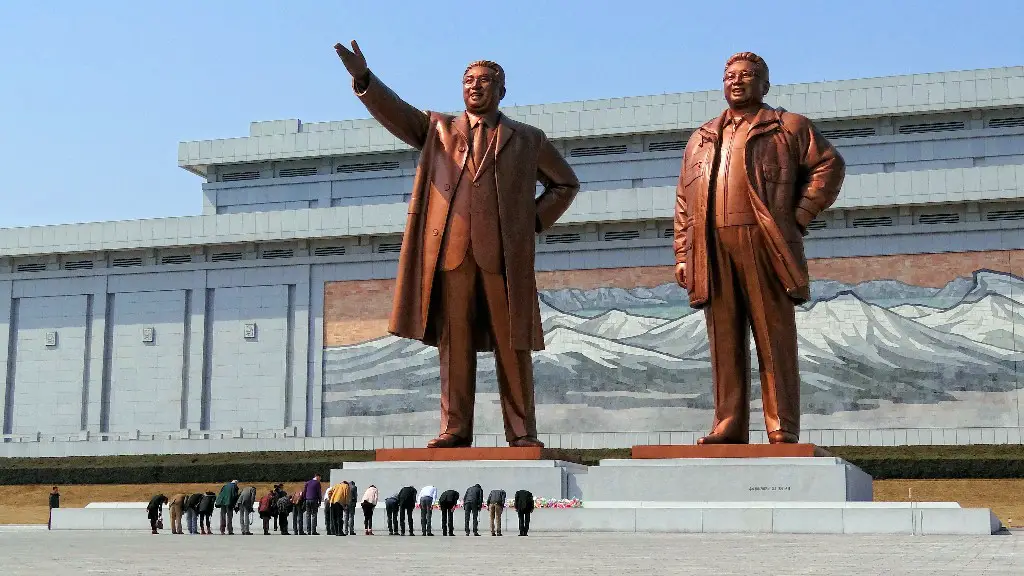Reasons Why North Korea Is a Developing Country
The development of a country’s economy is essential if it wants to progress and reach a more advanced state of development. The economy of North Korea is one of the least developed in the world and is considered a developing nation. North Korea has experienced several economic hardships since its founding, which have limited its economic growth and development. Despite attempts to improve its economic state, North Korea’s economy remains one of the most isolated and controlled in the world.
One of the main contributors to North Korea’s lack of development is the lack of investment from other countries. Many countries have expressed interest in partnering with North Korea in the past, but due to the country’s isolationist policies and lack of information about its inner workings, most countries have been hesitant to invest there. This lack of external investment has hindered North Korea’s development, as investment boosts economic growth and is necessary for any nation to progress.
Secondly, North Korea has a particularly poor infrastructure, which has had a large negative effect on its economic development. Many of the roads and bridges are in a poor state, and transportation links between cities and towns are limited, making trade difficult. In addition to the poor infrastructure, North Korea’s economy is hampered by its underdeveloped agricultural sector. Its agricultural sector relies heavily on primitive farming techniques, leading to a low productivity and a high risk of famine.
Furthermore, North Korea’s education system is in a very poor condition and this has resulted in a lack of training and skilled labor. This in turn has led to a lower productivity rate by citizens, as they are unable to gain the required skills needed to participate in a modern economy. Thus, North Korea’s labor force is not able to achieve maximum potential and make a significant contribution to its economic development.
Finally, North Korea has a history of extreme centralization of power and politics by its ruling party, the Korean Workers’ Party. This has made it very difficult for the country to develop. The government has been hostile to foreign investors and entrepreneurs, and it has also imposed sweeping restrictions on its citizens that have made it difficult for them to develop their own businesses. In addition, the government does not have access to certain aspects of technology that other countries have been able to adopt, such as internet access and digital communication.
Long-term Consequences of a Developing Country
The lack of economic development in North Korea has not only had an impact on the country itself, but it has also had consequences for other countries in the region. North Korea’s economic struggles have limited the country’s ability to participate in the global economy, leading to a lack of trade and investment from other countries. This has caused the country to become increasingly isolated, making it difficult for the world to engage in any meaningful foreign relations with North Korea.
Furthermore, North Korea’s economic hardships have had a negative effect on the lives of its citizens. The lack of investment and infrastructure has meant that poverty levels remain high, while access to healthcare and education remains limited. This has had a detrimental effect on the country’s population in terms of health, education and quality of life.
In addition, North Korea’s struggles with political stability have had a major impact on the economic progress of the country. Its frequent tensions with the United States and other countries in the region have led to the imposition of sanctions, which restrict the country’s ability to participate in the global economy. This has exacerbated the economic struggles of North Korea, making it increasingly difficult for the government to focus on economic development and reform.
Finally, North Korea’s lack of economic development has lead to a decrease in the country’s global influence. Its isolation from the rest of the world has resulted in a decline in its global position and a loss of power. This has resulted in the country being excluded from many global initiatives and negotiations, and this has had a negative impact on the country’s international standing.
Attempts to Improve North Korea’s Economic Situation
In spite of all its challenges, North Korea has made several attempts to improve its economic situation. The government has implemented several economic reforms in recent years such as liberalizing markets, encouraging foreign investment and encouraging entrepreneurship. These reforms have been met with mixed results and it is unclear whether they will be effective in the long-term.
North Korea has also attempted to improve its relations with other countries in the region. The country has recently become involved in diplomatic negotiations with the United States and other countries, although the results of these negotiations remain to be seen. North Korea has also established diplomatic relations with South Korea, leading to increased trade and investment from the south.
In addition, North Korea has taken steps to improve its infrastructure and education system. The government has begun investing in infrastructure projects and spending money to improve universities and schools. These projects have led to some improvements, although they are likely to take many years to have a significant impact on the economy.
Furthermore, North Korea’s government has attempted to ease some of its more oppressive laws, such as prohibiting speech and political expression. This has lead to some positive changes in the country, although it is still far from being classified as a liberal democracy.
Finally, North Korea has also taken steps to liberalize its economy and attract foreign investment. These policies have led to increased trade and investment from other countries, although the impact of these policies on the overall economy remains to be seen.
Strategies that Could Assist North Korea’s Economic Growth
In order for North Korea to make meaningful progress towards achieving economic growth, there are several strategies that should be implemented. Firstly, the government should continue its attempts to improve diplomatic relations with other countries, as this will lead to more trade and investment in the long-term. In addition, the government should loosen its restrictions on political expression, as this could lead to an increase in economic productivity.
Furthermore, the government should continue its investment in infrastructure and education. These investments will help to increase the productivity of the country’s population, as well as make it easier to engage in international trade. Finally, the government should make efforts to attract foreign investment, as this could lead to an increase in economic growth.
Political and Social Effects of North Korea’s Struggles
The economic struggles of North Korea have had a major impact on its political and social landscape. The lack of investment and low levels of education have resulted in a decrease in political participation, as well as a decrease in civil liberties. This has had a major impact on the population’s ability to engage in political discourse and allowed the government to stay in power by relying heavily on its repressive tactics.
Furthermore, the lack of economic development has had a major impact on North Korea’s international relations. The country’s isolationist policies have made it difficult for it to establish significant relationships with other countries, leading to conflicts with the United States and other countries in the region. This has further hindered the country’s ability to progress economically and make progress towards achieving more advanced levels of development.
Finally, the lack of development has also had an impact on the population’s sense of national identity. Many North Koreans have felt a sense of alienation from the rest of the world, and this has made it difficult for them to develop a sense of national pride or identity. This has had a negative effect on the country’s development, as a sense of national identity is necessary for any nation to make progress.
Potential Impacts of North Korea’s Development
While progress towards economic development in North Korea has been slow, it could still have a profound impact on the country’s future. Economic development could result in increased political participation, as well as increased economic freedom. This could lead to the introduction of more liberal governments, as well as more open political discourse.
In addition, economic development could also lead to an increase in national pride, as citizens becomemore aware of the country’s achievements. This could in turn lead to increased foreign investment, as investors become more confident in the potential for growth and stability in the country. Finally, economic development could lead to increased global influence and better diplomatic relations with the rest of the world.
Conclusion
North Korea is a country that has long struggled with economic development. Its lack of investment, poor infrastructure, and oppressive regimes have hindered its progress, resulting in high levels of poverty, isolation and civil unrest. The country has taken steps to improve its economic situation, but it will take some time before these efforts produce tangible results. Nonetheless, with the right measures and determination, economic development in North Korea is possible, and it could have a significant impact on the lives of the nation’s citizens, as well as its global standing.





